EXCLUSIVE: While the government has several programmes to tackle Severe Acute Malnutrition, lack of officials at the grassroots level means that those in urgent need don’t ever benefit from them
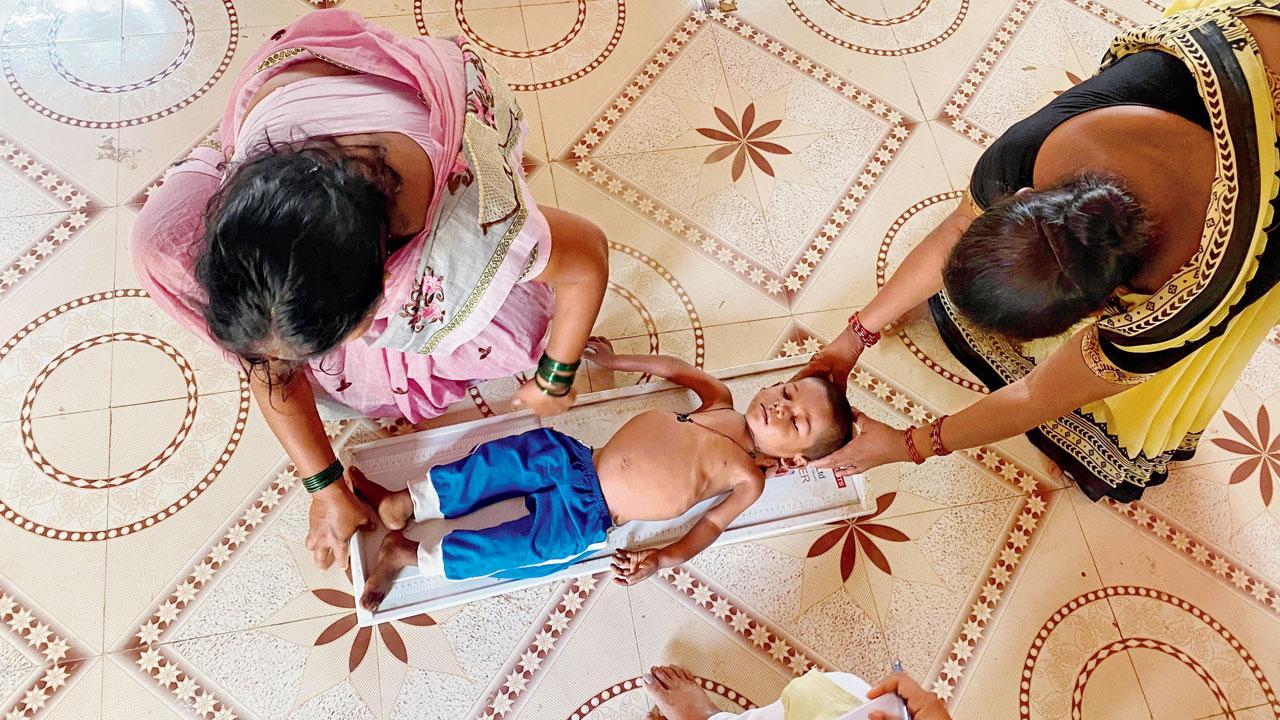
Anganwadi workers weigh a a malnourished child in the Palghar district
Key Highlights
- In 2020, there were 2,540 SAM children in 16 tribal-dominated districts
- How will the government reach out to tribals in the remotest hamlets?
- A contractual employee cannot take this huge responsibility, he said.
Underscoring the severity of malnutrition in the tribal-dominated districts of Maharashtra, government data procured through RTI by NGO Samarthan has revealed that 51,104 children aged up to six years have died of diseases caused by the prolonged lack of nutrients in the last 15 years. The government, however, appears to be oblivious to the reality as 101 key managerial and supervisory posts lie vacant in just Palghar, the nearest to Mantralaya among the state’s 16 tribal-dominated districts.
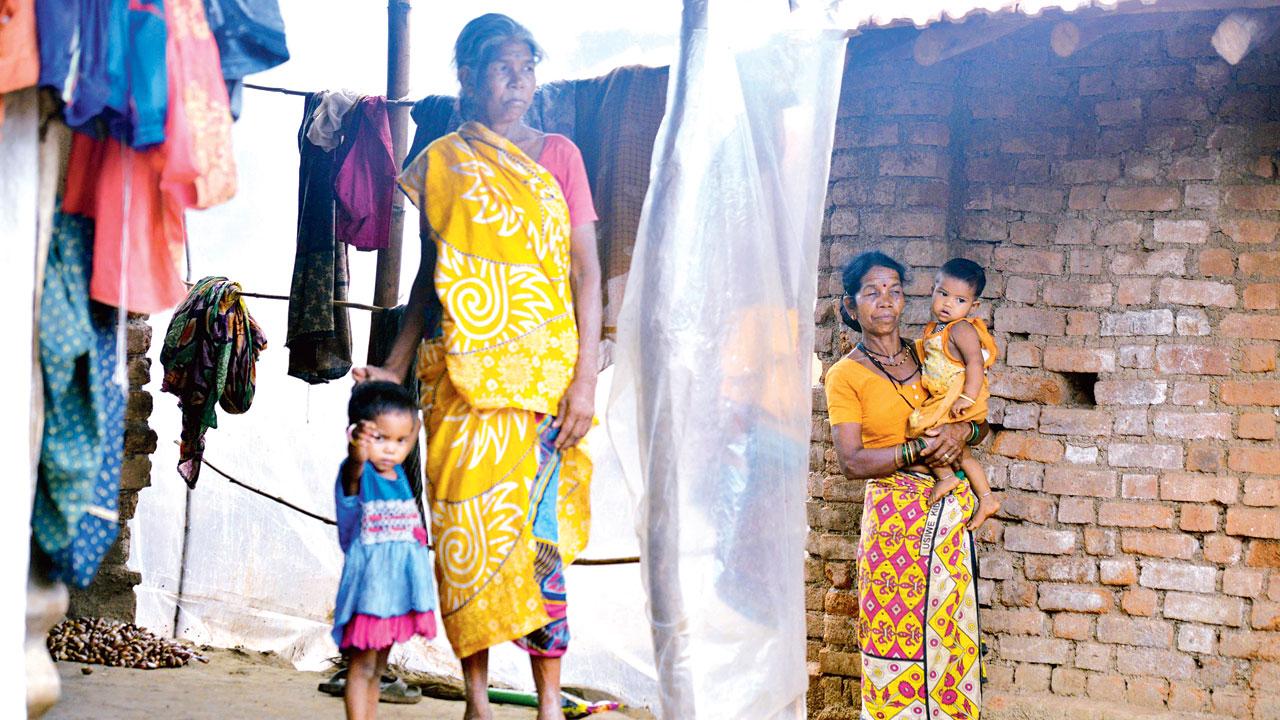
Not just tribal children, but their mothers are also affected by malnutrition. Pics/Hanif Patel
Though the Chief Executive Officer (CEO) of Zilla Parishad, Palghar district, said that vacant posts are being filled with contractual employees, an activist working for tribal issues said most of the vacant posts are at managerial and supervisory levels, which can be filled up by hiring responsible staff.
Tribes are spread across hamlets in coastal, urban and hilly regions of Thane, Raigad, Pune, Nashik, Ahmednagar, Dhuke, Jalgaon, Nandurbar, Amravati, Yavatmal, Nanded, Gondia, Gadchiroli, Nagpur, and Chandrapur. The living conditions of tribals would be no different in these districts than those living in Palghar. Despite various government schemes for employment, minimum wage, free grain and livelihood, the issues of low birth weight (LBW), pre-term birth and poor nutrition continue in tribal-dominated districts.
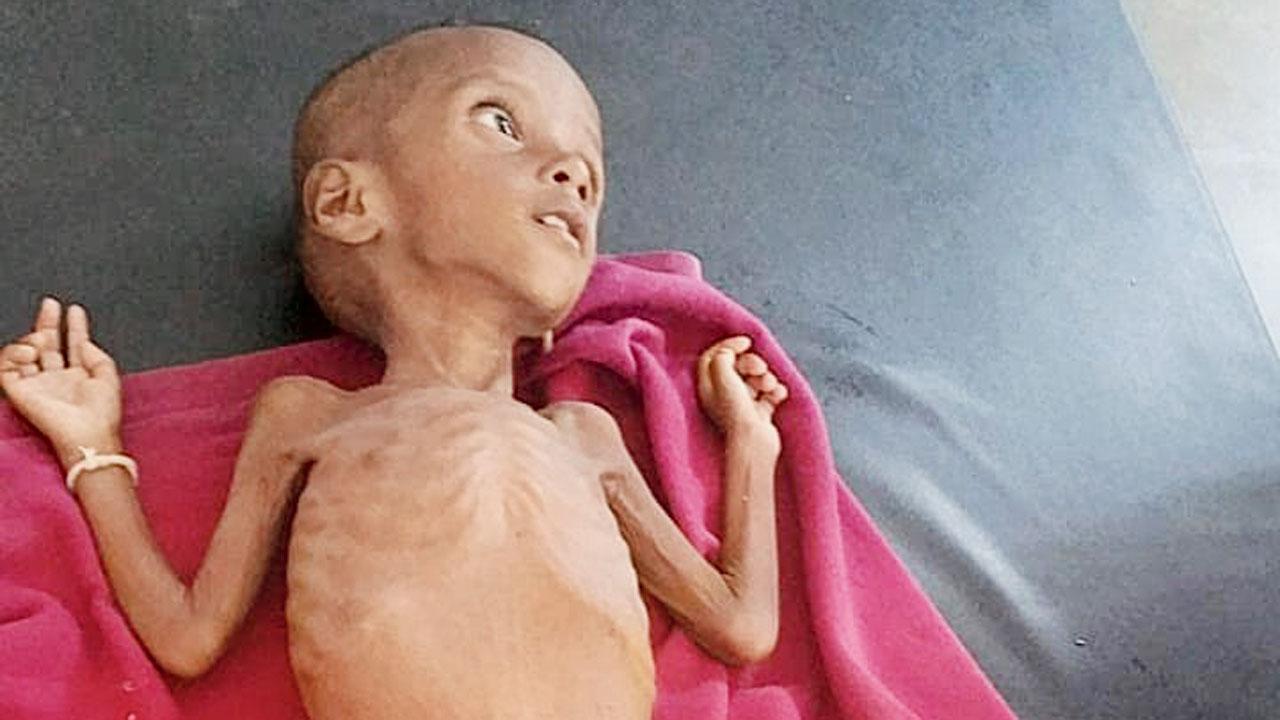
SAM in children across tribal regions has been increasing for three years, most acutely in Nandurbar district. Pics/Hanif Patel
“As per data sourced from the director, Health Department, Government of Maharashtra through RTI, in the last 15 years, more than 51,000 tribal children died in the state. The worst affected district is Nandurbar where the number of children with Severe Acute Malnutrition (SAM) has been on the rise in the last three years. Till December 2022, there were a total of 3,939 SAM children in Nandurbar,” said Rupesh Kir, co-ordinator of Samarthan, an NGO that works on government data to bring transparency in the budgetary process for the upliftment of tribals in Maharashtra.
In 2020, there were 2,540 SAM children in 16 tribal-dominated districts. The number rose to 2,960 and 5,327 at the end of 2021 and 2022 respectively, as per Samarthan’s report. The president of Zilla Parishad in Palghar district, Prakash Nikam, said, “Palghar is a tribal-dominated district, but more than 100 key posts have been vacant for many years. How will the government reach out to tribals in the remotest hamlets?”
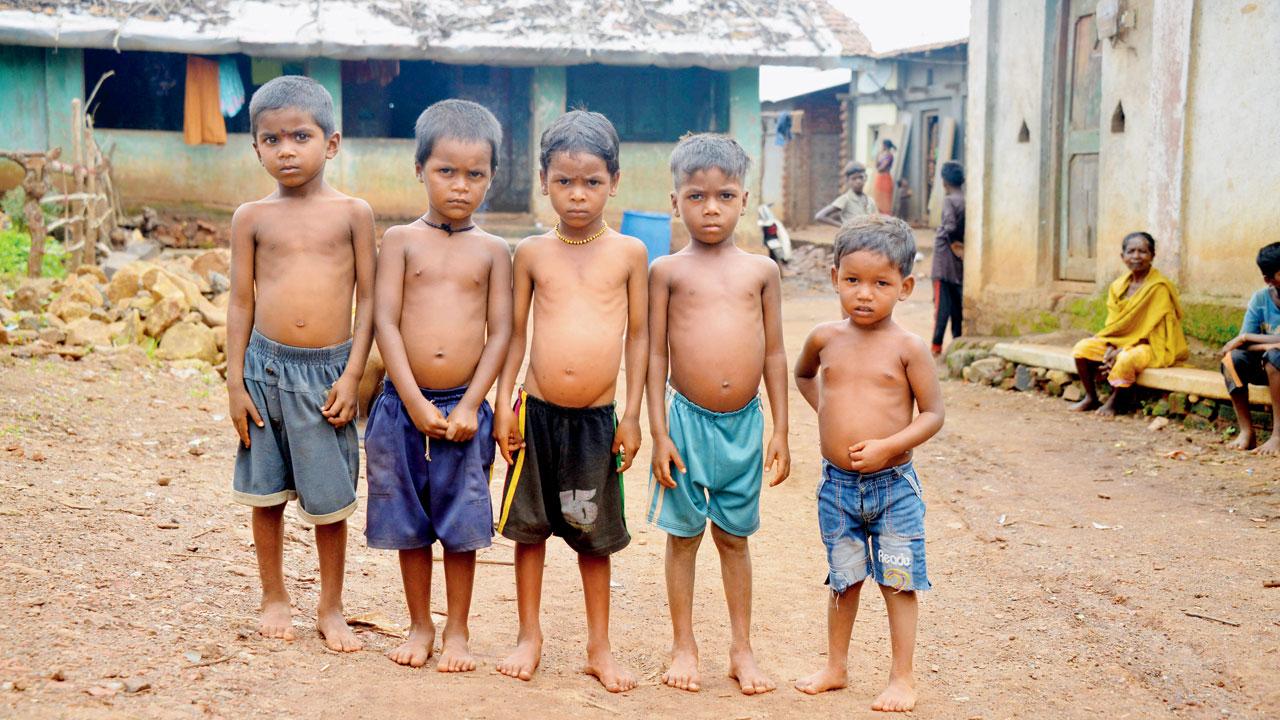
According to professionals working in tribal areas, low literacy among adults ultimately feeds into children’s malnourishment
Multiple posts vacant
Activist Vivek Pandit, who works on tribal issues, said, “Tribal populations continue to suffer a lot in Jawhar and Mokhada talukas in Palghar district. The government is yet to fill the posts of taluka-level Block Development Officers (BDOs), which have been vacant for a year. The post of district-level BDOs (Class-II) has been vacant for the last 13 years. Other posts like assistant project director; deputy program co-ordinator, deputy engineers in Talasari, Dahanu, Mokhada, Jawhar, Wada and Vasai; district welfare officer, and 20 posts in the primary education department are vacant. Other departments like water supply, health and agriculture have multiple key posts vacant for many years.”
Poor medical system
Dr Varsha Vinay Patil, who has been treating tribal children in Palghar district for many years, told mid-day that there is a shortage of medicines at hospitals in rural areas. “After seven years in Wada taluka, now I am treating tribal children in Jawhar taluka. Tribal children are completely neglected in the Palghar district. There is a huge shortage of iron tablets and antibiotics at hospitals in the Palghar district. The government has multiple schemes to uplift tribals but the shortage of medical staff and medicines at hospitals means that undernourished children are not treated on time,” Dr Patil said.
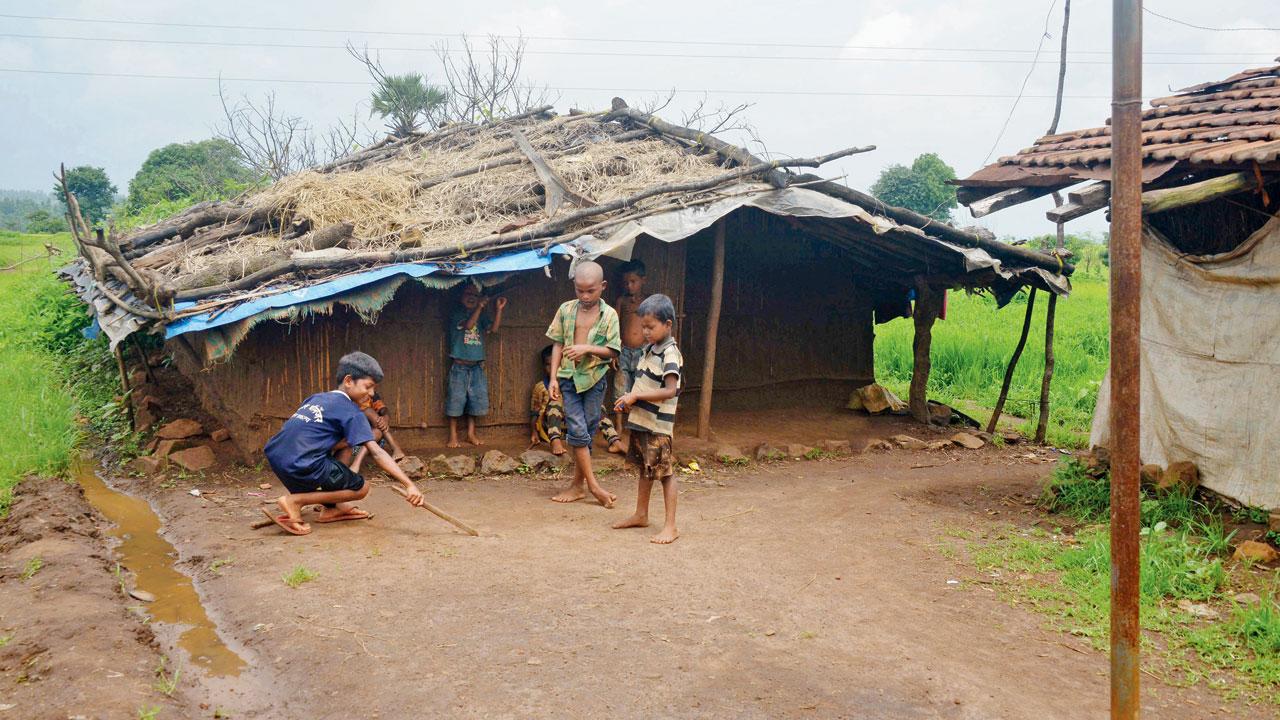
Malnourished children are more prone to pneumonia, recurring cough and cold, TB, etc
“Due to low immunity levels, underweight children get easily infected with many fatal diseases like pneumonia, recurring cough and cold, TB, etc. The mortality rate is high among tribal children because they are undernourished and not given proper care. Their mothers are also undernourished,” she added. “The issue of malnutrition is acute in tribal-dominated districts because the literacy rate is negligible. Tribal populations are unable to avail the facilities of all government schemes as most of them are unaware of them,” Dr Patil added.
‘Filling up posts’
The CEO of Palghar Zilla Parishad, Bhanudas Palve said, “We are filling up vacant posts with contractual employees. It is not a big issue. Early marriage, multiple pregnancies and poor literacy rate are the major issues on which we are working on a long-term basis. Due to early marriage, tribal girls are prone to delivering babies with low birth weights. Also, most lactating mothers tend not to breastfeed, due to which children later become undernourished. So we are already working on various issues simultaneously.” “Also, we have been running many programmes to boost nutrition in lactating mothers’ breast milk,” he added.
‘Govt must wake up’
Pandit, who also heads the state-level Tribal Development Review Committee, said that the conditions of infants and lactating mothers will continue to deteriorate if key posts are not immediately filled. “Palghar district administration is fully paralysed. The government’s development schemes are implemented through Zilla Parishad officials. How will the government schemes reach beneficiaries if key posts in tribal-dominated districts lie vacant for years?” Pandit said.
“How will employment-guarantee schemes be implemented? Why have these posts not been filled? BDOs and ABDOs can’t be hired on a contractual basis. Palghar is a tribal-dominated district where responsibility lies on government officers. A contractual employee cannot take this huge responsibility,” he said.
“If the government does not wake up on time to fill up these positions in Palghar district, grave issues like malnutrition and low birth weight will continue. This is the condition of just one district; the other 15 tribal-dominated districts also need the immediate attention of the state government to safeguard tribal children already reeling under SAM and Moderate Acute Malnutrition (MAM),” he said.
2,540
Kids with Severe Acute Malnutrition (SAM) in Maha in 2020
 Subscribe today by clicking the link and stay updated with the latest news!" Click here!
Subscribe today by clicking the link and stay updated with the latest news!" Click here!










